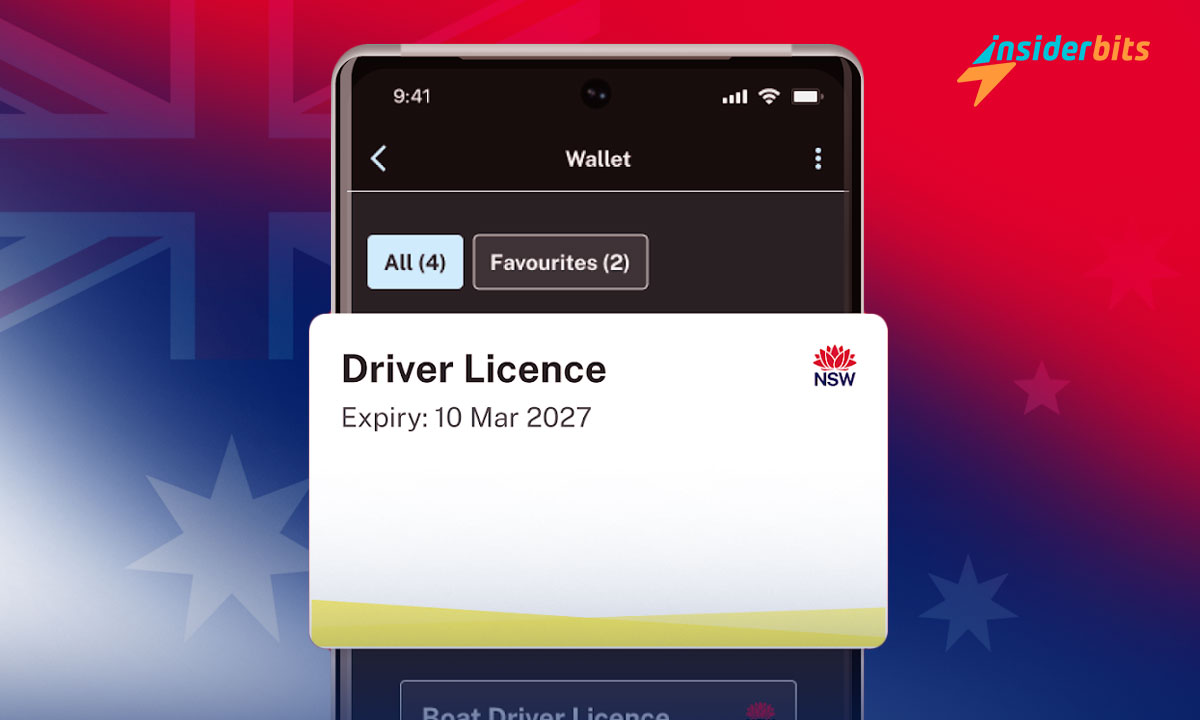The digital driver’s license in Australia carries their driver identification. This innovation began to be gradually implemented autonomously across the country and each territory. Official apps give drivers access to their licenses directly from their mobile phones.
The transformation of the Australian driver’s license responds to citizens’ current needs. This system facilitates immediate access to license information and incorporates advanced security features that protect individual data.
At Insiderbits, we have offered you this little guide on this document in Australia and how to obtain it. Let’s get started!
What is the digital driver’s license in Australia?
It is an official electronic version of the traditional physical license in Australia. It is accessible through authorized government applications. This format makes it easy to verify the driver’s identity and their right to drive using a smartphone.
These cards include all the information found on the physical version: photo, personal details, type of license, and restrictions. They also have dynamic elements such as holograms and QR codes that are updated periodically to ensure authenticity.
This document’s main feature is that it is kept up to date with the information from the driving record. If there are changes in the address, restrictions, or license status, these are automatically reflected in this form. This format does not replace the physical card but works as an official complement.
Availability by states and territories
New South Wales implemented it in 2019, South Australia in 2017, Victoria and Queensland in 2024 and 2023, respectively. This means that the electronic license covers a large part of the Australian territory. The other missing territories are already studying its implementation.
Each jurisdiction has developed its official app to manage digital licenses. In Victoria, for example, it is accessed via the myVicRoads app, while in New South Wales, the Service NSW app is used.
Queensland controls its e-licenses through the Queensland Digital Licence app. In South Australia, they use the mySAGOV application, one of the most widely accepted apps in the country. Each region adapts the system to its needs and existing technological infrastructure.
General requirements for obtaining a digital driver’s license
Being an extension of the physical driver’s license, the requirements to obtain it are pretty simple. Let’s see:
New South Wales
- Have a valid and current NSW Australian driver’s license
- Download the Service NSW app
- Create a verified Service NSW account
- Have a compatible mobile device running iOS 10+ or Android 7+
- Maintain an internet connection for regular updates
South Australia
- Possess a valid South Australian driver’s license
- Have the mySAGOV app installed
- Mobile device with up-to-date operating system
- When you download the app, your license is automatically added
Queensland
- The Queensland Government emphasizes that obtaining a digital license is optional
- You must have a physical license to apply for one.
- You must download the Queensland Digital Licence app
- You must then create it in the app
- By creating it, your e-license will be automatically activated
Victory
Be the holder of an entire Victorian driving license
- Mobile device compatible with the latest versions of iOS or Android
- Have the myVicRoads app
- Create a verified account on myVicRoads
- Activate two-step verification
Advantages and features of Australian digital driver’s license
It offers functionality beyond simple digitalization. Its main screen displays an animated hologram and a QR code that is updated every so often. This guarantees the document’s authenticity in real time and makes any attempt at falsification difficult.
One of the most notable advantages is the automatic updating of information. Any changes in the registration, such as address changes or new restrictions, are instantly reflected in the virtual card, eliminating the need to request a new physical card.
The system also facilitates quick verification for companies and authorities. With a simple scan of the QR code, they can confirm the validity of the document and review its information. In this way, procedures and controls are significantly streamlined.
Security and privacy
Digital driver’s licenses in Australia incorporate multiple layers of protection to safeguard personal information. The security system used varies from state to state. Access to the application is via biometric systems or email and password. In addition, a unique PIN code is used that the user sets during the initial setup.
Data transmission between the mobile device and government servers uses state-of-the-art encryption. This ensures that personal information remains secure during updates and verifications and prevents any unauthorized interception.
Dynamic QR code technology adds a layer of security. Its constant updating prevents the capture and reuse of the code, while the hologram makes it challenging to create fake copies of the document.
Use and validity of this card
The electronic pass complements the physical one, not replaces it. Its validity is recognized throughout the issuing state or territory, allowing its use in police checks, identification in stores, and government procedures.
Acceptance of this format is constantly expanding. More and more establishments, from hotels to car rental companies, recognize and accept this version. For situations without an internet connection, it is recommended that you present the physical version of the card.
Professional drivers and those between states should know that this version of permit acceptance varies by jurisdiction. Therefore, it is advisable to check the specific regulations of each region and always keep the physical version available.
Differences between the physical and virtual card
The physical and virtual cards have distinctive features that complement each other. This format stands out for its ability to update in real-time, always showing the most recent information. Meanwhile, the physical card maintains the information current at the time of issue.
Another notable difference is portability. It relies on a smartphone and an internet connection, while the physical version works independently—you just have it on hand, and that’s it. This feature makes the traditional format especially valuable in situations where technology can fail.
Recognition and acceptance also make a significant difference. While the conventional license is universally accepted throughout the country, the electronic license still has limitations. Some regions and establishments will require a physical permit even if you present this version.
The future of the digital driver’s license in Australia
The virtual permit represents a step forward in modernizing Australian government services. This technology simplifies drivers’ lives, improves identity, and permits security verification.
If you consider getting yours, you must first arrange for your physical license. To do so, we recommend the following post here at Insiderbits: Getting Your First Driver’s License: Essential Steps to Follow. Stay informed with us! Browse our Insiderbits website!





